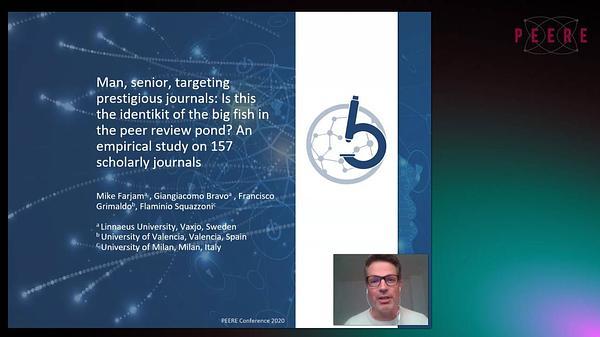Would you like to see your presentation here, made available to a global audience of researchers?
Add your own presentation or have us affordably record your next conference.
keywords:
pandemic science
peer review process and models
peer review
Objective Although peer review is an essential component of
publication for new research, the viability of this process has
been questioned, particularly with the added stressors of the
COVID-19 pandemic. This study characterized rates of peer
reviewer acceptance of invitations to review manuscripts,
reviewer turnaround times, and editor-assessed quality of
reviews before and after the start of the COVID-19 pandemic
at a large, open-access general medical journal.
Design This retrospective, pre-post cohort study examined
all research manuscripts submitted to JAMA Network Open
between January 1, 2019, and June 29, 2021, either directly
or via transfer from other JAMA Network journals, for which
at least 1 peer review of manuscript content was solicited.
Measures were compared between the period prior to the
World Health Organization declaration of a COVID-19
pandemic on March 11, 2020 (14.3 months), and the period
during the pandemic (15.6 months) among all reviewed
manuscripts, and between pandemic-period manuscripts that
did or did not address COVID-19. For each reviewed
manuscript, the number of invitations sent to reviewers,
proportions of reviewers accepting invitations, time in days to
return reviews, and editor-assessed quality ratings of reviews
were determined.
Results In total, the journal sought review for 5013
manuscripts, including 4295 Original Investigations (85.7%)
and 718 Research Letters (14.3%); 1860 manuscripts were
submitted during the prepandemic period and 3152 during
the pandemic period. Overall mean (SD) volume of
manuscripts reviewed per week increased from 30.3 (8.6) to
46.4 (12.2) manuscripts; P < .001. Comparing the
prepandemic period with the pandemic period, a greater
proportion of invited reviewers declined to review during the
pandemic (from 33.0% to 34.5%; P = .02), and the mean (SD)
number of reviewer invitations per manuscript increased
(from 5.99 3.57 to 6.99 4.46; P < .001). However, the
mean (SD) number of reviews rated as high quality (very good
or excellent) per manuscript increased from 1.28 (0.72) to
1.48 (0.68), and the mean (SD) time for reviewers to return
reviews was modestly shorter (from 15.82 7.61 days to 14.35
6.95 days; P < .001), a difference that persisted in
regression models accounting for manuscript type and topic.
Conclusions In this cohort study, peer reviewers were less
likely to accept invitations to review manuscripts during the
pandemic, but the speed and editor-reported quality of
reviews improved. Additional study encompassing a broader
set of journals will be necessary to understand the
generalizability of these results, and to clarify how the
pandemic has affected reviewer burden and fatigue.
Conflict of Interest Disclosures Roy H. Perlis, Ishani Ganguli,
Jesse A. Berlin, Steven M. Bradley, Sebastien Haneuse, Sharon
K. Inouye, Elizabeth A. Jacobs, Arden Morris, Eli Perencevich,
Lawrence N. Schulman, N. Seth Trueger, Stephan D. Fihn, and
Frederick P. Rivara report receiving financial support from JAMA
Network for service as editors at JAMA Network Open. Jacob
Kendall-Taylor and Annette Flanagin are paid editorial staff for the
JAMA Network. Annette Flanagin is executive director of the Peer
Review Congress but was not involved in the review or decision of
this abstract. Roy M. Perlis additionally reports receiving personal
fees for service on scientific advisory boards for Belle Artificial
Intelligence, Burrage Capital, Circular Genomics, Genomind,
Psy Therapeutics, and RID Ventures and holding equity in Belle
Artificial Intelligence, Psy Therapeutics, and Circular Genomics.


